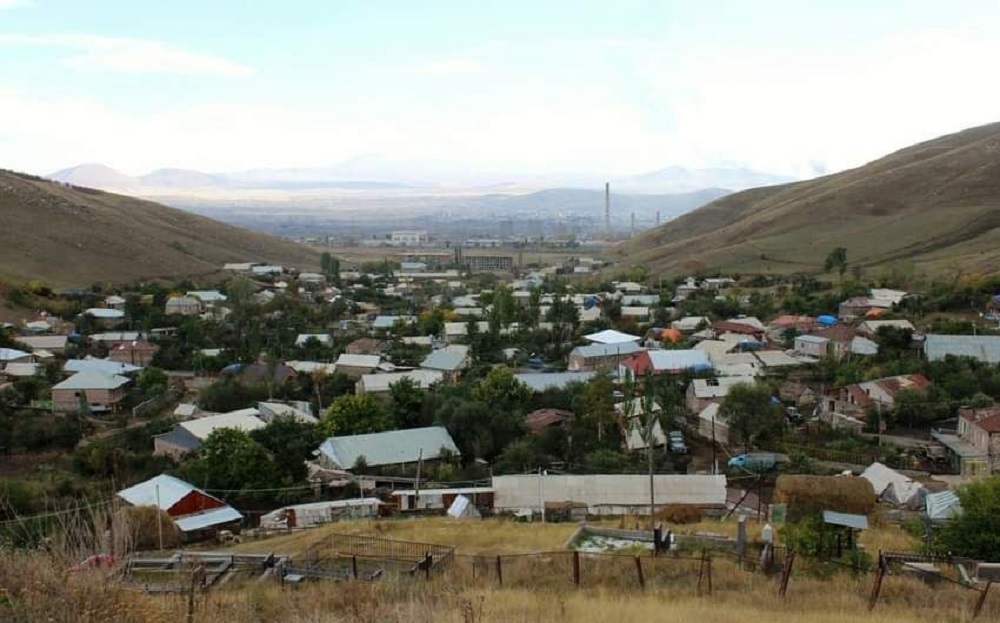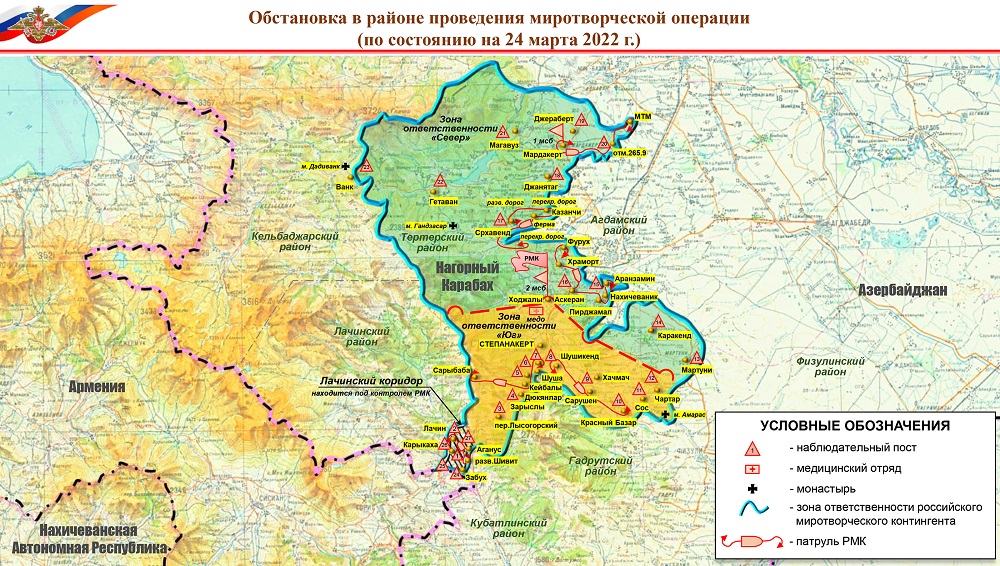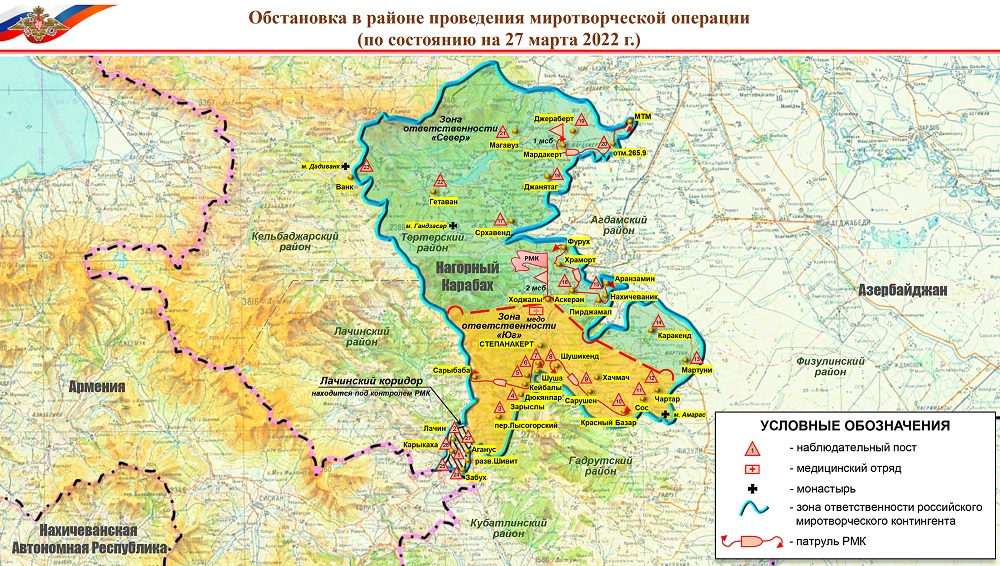'Triarchy' in Karabakh? Conflicting reports from Armenian, Russian, Azerbaijani state agencies
In the eastern part of Karabakh, where Russian peacekeepers are temporarily stationed, a rather strange and unprecedented situation has developed since the end of the second Karabakh war. Three departments have reported troop dispositions at the Dashbashi/Karaglukh height and the nearby village of Farrukh/Parukh, however, all reports are completely inconsistent with each other.
- Armenia claims Azerbaijani forces captured strategic point in Karabakh
- “We must investigate actions of Russian peacekeepers”: PM Pashinyan’s appeal to Putin
- “Anti-Russian front in Caucasus?” – Moscow and Baku exchange accusations amid escalation in Karabakh
On the evening of Sunday, March 27, the Russian Ministry of Defense published another newsletter of the peacekeeping contingent in Karabakh. It stated that the peacekeepers managed to achieve withdrawal of the Azerbaijani armed forces from the village of Furukh (as the village of Farrukh/Parukh is called in the bulletin) through negotiations. It was also noted that the Azerbaijani army and the Armenian armed forces suffered losses – two wounded on each side.
The Russian defense department did not report anything about the situation at the Dashbashi/Karaglukh height.
Almost immediately after the publication of the newsletter of the Russian Defense Ministry, the Ministry of Defense of Azerbaijan issued a response in which it accused Moscow of lying. According to information from Baku, the Azerbaijani troops did not retreat anywhere from the positions occupied on March 24. The Ministry of Defense of Azerbaijan once again called on the Russian Ministry of Defense to be legible in naming villages in the territory under Azerbaijan’s control.
In turn, the Russian Ministry of Defense accused the Armenian Foreign Ministry of providing incorrect information in its statement.
This morning, the information center in Khankendi/Stepanakert provided its own version of events. According to the authorities of the unrecognized Nagorno-Karabakh Republic, the village of Farrukh/Paruh is under the control of peacekeepers. As for the Dashbashi/Karaglukh height, one part is controlled by Azerbaijanis and the other by Armenians.

Reports from Moscow
A Russian Defense Ministry fact sheet dated March 27 states:
“Two violations of the ceasefire regime were recorded by the armed forces of the Republic of Azerbaijan in the Askeran region. As a result of the skirmish, two people from each side were injured. The command of the Russian peacekeeping contingent, in cooperation with representatives of the parties to the conflict, stabilized the situation.
Based on the results of the negotiations, the Azerbaijani side carried out the withdrawal of its units from the area of the FURUKH settlement.
Information from Baku
“The Ministry of Defense of Azerbaijan regrets that the points reflected in the statement of the Russian Ministry of Defense dated March 27, 2022 do not correspond to reality”, the press service of the Azerbaijani Defense Ministry said.
“The positions of the Azerbaijani army in the village of Farrukh, which is part of the sovereign territory of our country, and in the mountainous regions adjacent to it, have not changed. Information about the withdrawal of Azerbaijani army units from these positions does not correspond to reality. Our army is in full control of the operational situation.
The statement of the Russian Defense Ministry about the alleged violation of the ceasefire by Azerbaijan is also untrue, and there are no reports of casualties among Azerbaijani servicemen. We would like to remind once again that there is no administrative-territorial unit called “Nagorno-Karabakh” in the territory of Azerbaijan.
The use of the expression “Nagorno-Karabakh” in the statements of the Russian Defense Ministry on March 26 and 27 is a disrespect for the territorial integrity of Azerbaijan, recognized and accepted by the international community, including the Russian Federation.
I would like to remind the Ministry of Defense of the Russian Federation that in the first paragraph of the declaration on allied cooperation, signed by the presidents of the two countries on February 22, 2022, it is noted that “the Russian Federation and the Republic of Azerbaijan define their relations as allied cooperation based on mutual respect for independence, state sovereignty, territorial integrity and inviolability of the state borders of the two countries, as well as the principles of non-interference in internal affairs, they are based on the commitment to the principles of peaceful settlement of disputes and non-violence or threat of force.
In addition, according to paragraph 18 of the declaration, the Russian Federation and the Republic of Azerbaijan are joining forces in the fight against the threats of international terrorism, extremism and separatism and their neutralization.
In its statement, the Ministry of Defense of the Russian Federation also demonstrates disrespect for the declaration signed by Russian President Vladimir Putin.
The Ministry of Defense reiterates that there is no village called “Furukh” in the Khojaly region of Azerbaijan. The name of the mentioned village is Farrukh. We hope that in the following statements the name of the village will be indicated correctly”,2 the Azerbaijani Defense Ministry said in a statement.
Information from Yerevan
The Ministry of Foreign Affairs of Armenia issued a statement in which, first of all, it expressed satisfaction with the fact that “the OSCE Minsk Group Co-Chairs gave a clear assessment of the recent escalation of the situation in Nagorno-Karabakh, stating that it is a consequence of the redeployment of Azerbaijani troops”.
The Armenian Foreign Ministry quotes a statement by the Russian Defense Ministry, which says that the Azerbaijani side has withdrawn its units from the settlement of Parukh in Nagorno-Karabakh and states:
“The invasion of Azerbaijani units into Nagorno-Karabakh in the zone of responsibility of the Russian peacekeeping contingent continues. We expect that the peacekeeping forces of the Russian Federation in Nagorno-Karabakh will take concrete measures to stop the invasion of Azerbaijani units in the zone of responsibility of the peacekeepers and the withdrawal of the Azerbaijani armed forces. We consider it important that a proper investigation of the actions of the peacekeeping contingent be carried out during the entire period of the invasion of the Azerbaijani units and that answers be given to a number of questions”.
Maps are attached to the text of the application. The area of responsibility of the Russian peacekeeping contingent, indicated on the map, was taken from the website of the Russian Ministry of Defense. It is also explained that on the map representing the situation of March 24, there are no Azerbaijani bases in the zone of responsibility of the Russian peacekeeping contingent in Nagorno-Karabakh.

On the map showing the situation as of the morning of March 28, it is clear that the Azerbaijani positions are in the zone of responsibility of the Russian peacekeeping contingent in Nagorno-Karabakh.

Information from NK
The information headquarters of the unrecognized NKR issued a message stating that as of 12:00 on March 28, the situation along the entire line of contact is relatively stable, no significant violations of the ceasefire regime have been recorded.
As for the village of Parukh, according to the headquarters, it is under the control of the Russian peacekeeping forces. Moreover, the report says that “thanks to the efforts of the Artsakh Armed Forces, the Armenian side managed to stop the advance of the Azerbaijani forces and maintain control over the main part of Mount Karaglukh”:
“Azerbaijani troops continue to remain in fortified positions only in the part of Karaglukh. Work continues with the command of the Russian peacekeeping forces on the return of the Azerbaijani side to their original positions”.
Commentary from Baku
Member of the Azerbaijani parliament Rasim Musabekov commented on the differences between the reports of the Russian and Azerbaijani defense ministries.
“Two recent incidents have escalated the situation and led to an exchange of harsh statements by the Defense Ministry and the Foreign Ministries of the Russian Federation and Azerbaijan. The Russian military, citing the negative reaction of local Armenians and contrary to their obligations, refused to escort the Azerbaijani convoy to pass through the Aghdara (formerly Mardakert) region in the direction of Kelbajar.
As a result, Baku decided to build a new road along the northern shore of the Sarsang reservoir, which, in turn, caused a nervous reaction among the Armenians.
On top of that, a direct conflict occurred in the area of the village of Farrukh and the mountain of the same name, on which Armenian illegal formations began to build fortifications. All warnings about the inadmissibility of these actions, which were transmitted both through the RMK and through the loudspeakers, were ignored. Moreover, shots were fired at Azerbaijani positions from unfinished fortifications.
Taking into account the fact that Mount Farrukh positionally dominates the city of Aghdam, which is being restored and where civilians should soon return, a decision was made and implemented to neutralize this threat in advance. No matter how “terrible” of statements foreign Armenian lobbyists make, Azerbaijan has the right to ensure security on its territory and will not tolerate arbitrariness of illegal Armenian military formations”.
Musabekov also assessed the likelihood of “punishment” of official Baku by the Kremlin for such “obstinacy”.
It should be noted that some Russian bloggers expressed the opinion that Russia could strike at strategic facilities in Azerbaijan.
“If someone in Moscow has ideas about “punishing” Azerbaijan and the desire to escalate the conflict in order to use it as an excuse to strike at our strategic pipeline infrastructure, then this is a bad idea.
It is known that on a far-fetched pretext – allegedly an accident at remote shipping points – the export of Kazakh oil from Novorossiysk was stopped. If some “hotheads” believe that by creating difficulties for the export of Azerbaijani oil and gas, Western countries can be forced to refuse or soften the embargo on the purchase of Russian energy resources, then they are greatly mistaken.
I believe that Baku, Tbilisi and Ankara will take measures in advance to strengthen the security of the pipeline infrastructure. In the context of a confrontation with NATO over the invasion of Ukraine, it is useful for sober-minded Russian politicians and the military to recall Talleyrand’s wise saying that “good diplomacy should not multiply the number of enemies”. Indeed, in the event of Moscow’s threatening actions, neither Azerbaijan nor Turkey will remain neutral”, the parliamentarian noted.
Commentary from Yerevan
Political observer Hakob Badalyan believes that the Armenian side hinted to the Russia that the peacekeepers in NK had made a criminal deal. This, according to the expert, in particular, is stated in the report on the telephone conversation that took place on March 26:
“In the report on the Pashinyan-Putin telephone conversation, Yerevan uses strictly diplomatic language, to the extent that the Prime Minister of Armenia informed the President of Russia about the need to investigate the actions of Russian peacekeepers. In other words, it was a hint that the peacekeepers made a criminal deal with Baku. Could they have done it without the Kremlin’s approval? This is, of course, a rhetorical question”.
Commentary from NK
The head of the Stepanakert Press Club, Gegham Baghdarasaryan, wrote on his Facebook page:
“I think that until the official Stepanakert gives a principled political assessment of the situation, it will not be possible to change this destructive process. A fundamental assessment that calls spade a spade. It’s time to stop qualifying Azerbaijani aggression as an attempt to discredit the peacekeeping mission, it’s ridiculous laugh and destroys the remaining respect for us.
Until there is an honest and principled assessment, the demand of the Artsakh Foreign Ministry will not be fulfilled, namely, “a strict assessment by the international community of the anti-Armenian aggressive policy of Azerbaijan”. This same international community expects from us a strict and comprehensive assessment of the current situation, on the basis of which we must express our position.
Of course, self-organization of the Artsakh society and public actions aimed at this are very important in this regard, but I think that they should be filled with new content. Not only by appeals addressed to the international community, but also by the formation of a new political agenda, a new political thought in Artsakh itself, efforts under pressure from society to modernize and make [state] institutions more efficient.
It seems that this public initiative should in principle be beneficial to the government, which is concerned about the fate of the country. However, the authorities of Artsakh go the other way, trying to restrain this initiative. And the existing political institutions of Artsakh are not able to form a new political agenda. This is a dead end”.


















